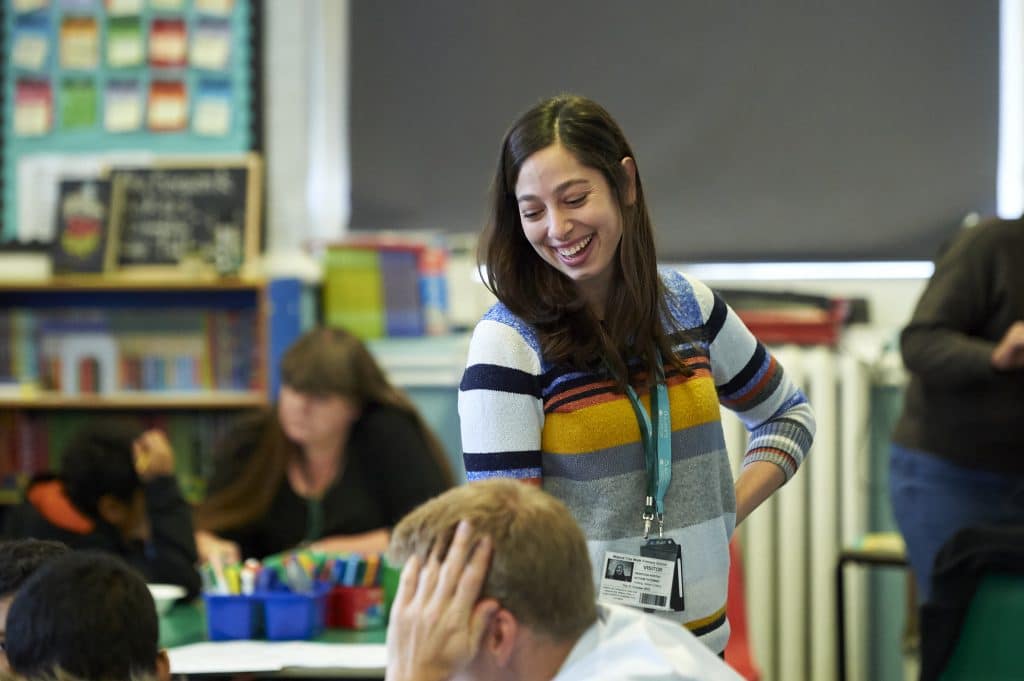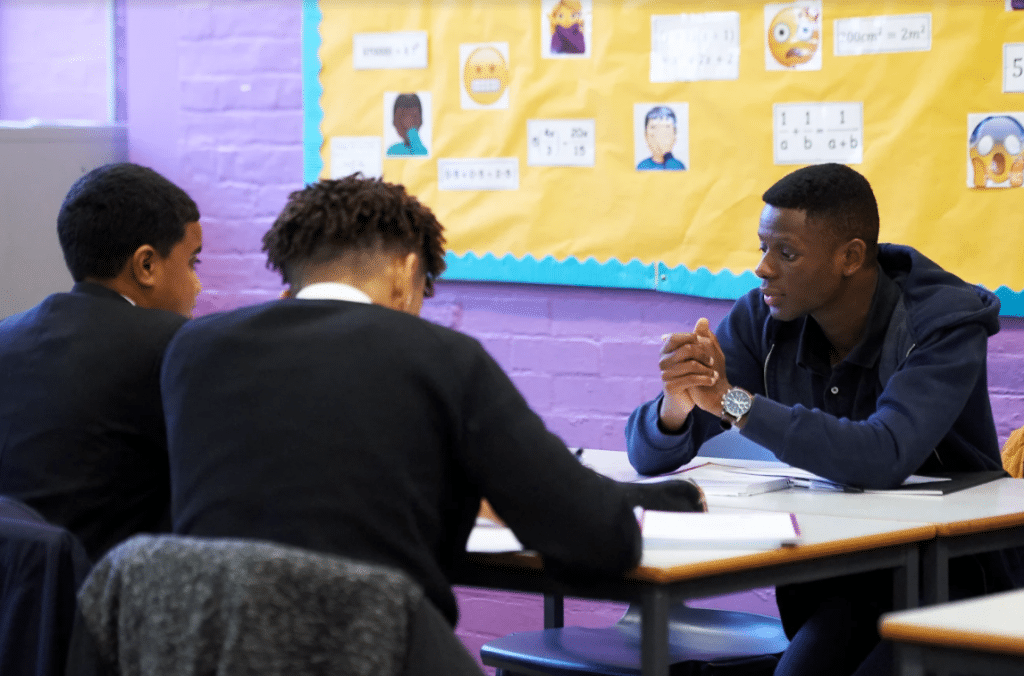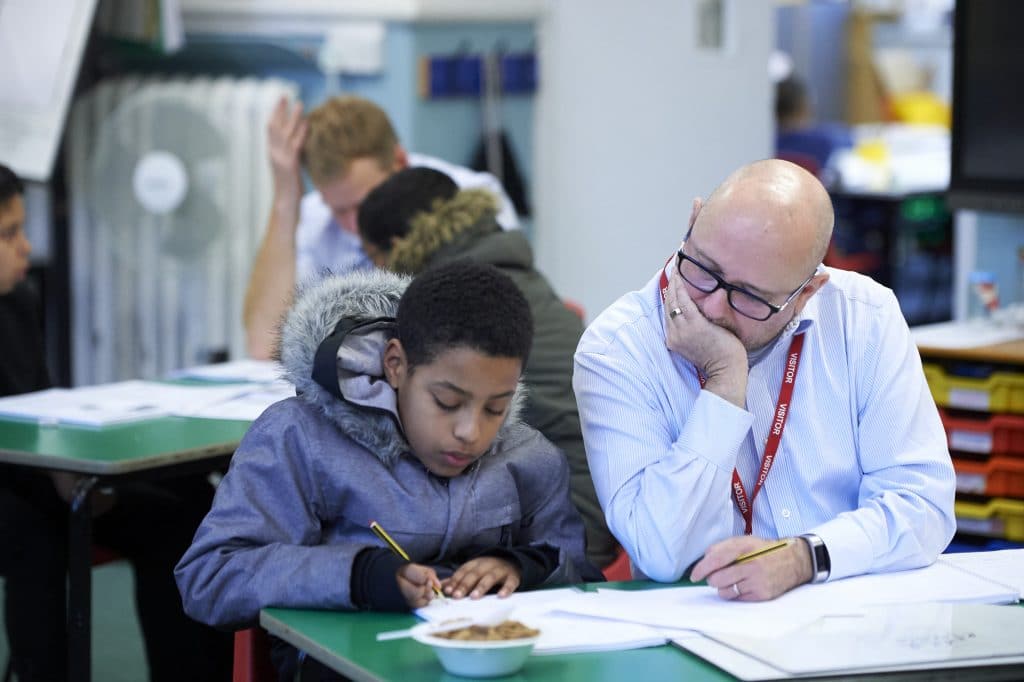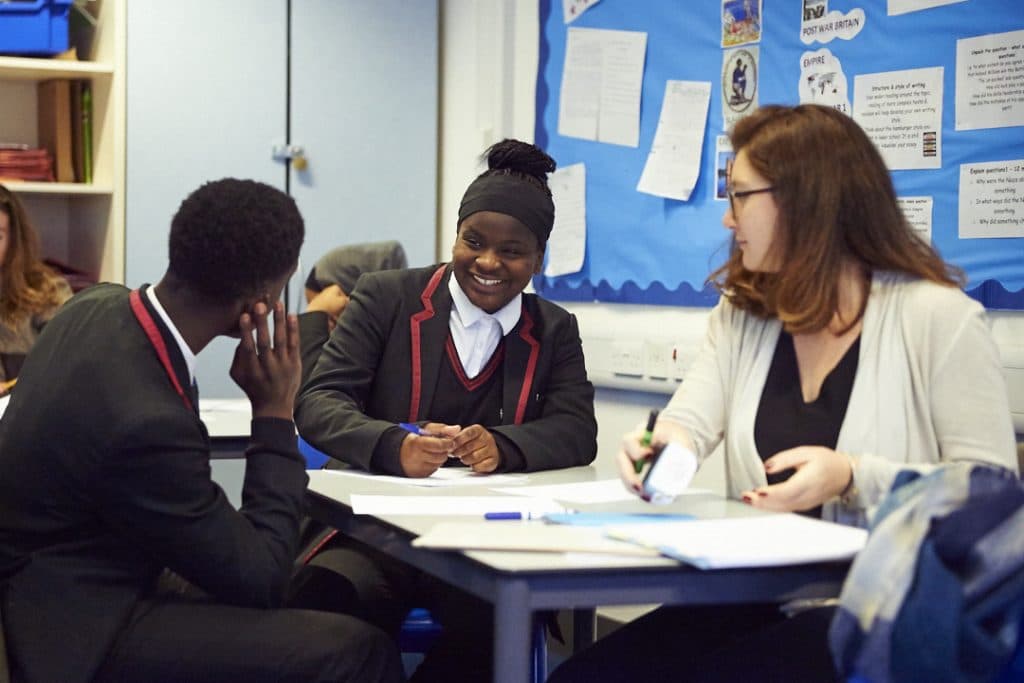Social Action
‘Thank You’ notes from pupils that warmed our hearts in spring term
26 April 2023
We can think of thousands of reasons why working with children brings us joy, purpose, and fulfilment. But what’s even more heart warming is when the children you support recognise your impact on their lives and share inspiring thank-you notes of appreciation. Thank you, tutors!
Despite the odd challenge of managing children during sessions, their boundless energy, honesty and humour keep us all going.
Watching pupils grow in subject knowledge and confidence is even more motivating for our volunteers who spend an hour each week to help them improve their English and maths skills.
With summer term just beginning, let’s throwback to some of the remarkable words and notes of gratitude some pupils shared with our volunteers and programme team in schools last term.
1. Being a child’s favourite grey-haired person is indeed a compliment!
2. Sometimes, playing is learning and learning is playing. Finding the best approach for every child is essential.
3. Appreciation in poetry
4. Group high-5 for Brenda
5. World’s best!
6. The best tutor award goes to…
7. Is there anything like positive anger?
8. Tutoring goes beyond knowledge. Changes behaviours and attitudes too.
9. Levelling up
10. Certainly a good use of time!
Why we do what we do
These words of appreciation and witnessing a pupil grow from strength to strength are why we do what we do.
Why not join us and shape a child’s future by volunteering an hour a week to help them improve their academic performance in English or maths?
Why your 2022 new year’s resolutions should include volunteering with Action Tutoring
21 December 2021
As surprising as it may seem, given many of us are still processing 2020, 2022 is just around the corner. This is the perfect time to pause and reflect on what’s important to us, clear our mind and work towards achieving new goals. Setting resolutions can be a great way to focus on the person we want to become by improving our skills, developing new ones and getting out of our comfort zone.
At Action Tutoring we believe that one of the most important resolutions we can set for ourselves is making a positive change in the world. Volunteering as a tutor is a great way to do this and we encourage everyone to find time in 2022 to join.
Tutoring provides a tangible way to grow personally and professionally. This is what one of our our amazing volunteers from Liverpool, Paige, said about her experience:
I have gained valuable transferable skills whilst volunteering with Action Tutoring. It has given me experience of a career path I hadn’t previously considered. The impact you can have on a child’s life is one of the most rewarding things any volunteering could offer!
Our volunteer tutors have not only made a positive impact on the lives of disadvantaged young people, but they have experienced positive benefits for themselves too.
Here is why you should include volunteering with Action Tutoring in your 2022 resolutions:
Volunteering as a tutor leads to self awareness
Volunteering is an eye opening experience which can help to identify your strengths, areas to improve and your personal values. Volunteering as a tutor can be an excellent way to improve your self-awareness through the feedback you receive and as you develop your skills.
A great way to track this development is by reflecting after each session. Writing down any new learnings, skills developed or observations will provide a valuable resource to refer back to for future tutoring sessions or other activities.
Volunteering can boost your interpersonal skills and confidence
Volunteering with Action Tutoring can be a brilliant way to enhance your interpersonal skills as you interact with people of different ages from different backgrounds, cultures and experiences in new situations.
As a tutor, you will practise active listening and asking open-ended questions to your pupils during the tutoring sessions, these are valuable transferable skills for the workplace and socially.
Time doesn’t need to be a barrier
We understand how hectic our daily life can be so we ask all our volunteers to simply give one hour each week to tutor and directly support disadvantaged pupils. Time shouldn’t be a barrier for your 2022 resolutions.
Amber, currently in her final year, studying for her BA in History at Nottingham Trent University has said that “the actual delivery of the session plus planning time is completely doable alongside other commitments”. She would urge anyone considering an application not to worry about whether they can fit it in as it is “totally manageable”. She also expressed how “the benefits of tutoring are endless but above all, children are our future and each child deserves that chance to prosper, blossom and thrive”.
Let’s make sure 2022 the year of giving back.
Why volunteering as a tutor is the best Christmas gift
6 December 2021
The holiday season is an excellent opportunity to get involved in volunteering and give your time to help others who are facing challenges or are less fortunate. As December rolls on, the pressure to spend becomes even stronger and makes us forget the true meaning of Christmas. The best way to spread the holiday spirit and joy is to give back to those who need it the most.
That’s why we encourage you to not get worried about what Christmas gifts to buy, but instead spend some time thinking about how rewarding the experience of volunteering is.
Action Tutoring gives you the opportunity to support disadvantaged pupils so they can have a stronger learning foundation and a firm footing for a bright future.
Even if you’re not based in one of our regions, or you have responsibilities that require you to be at home, you can still get involved as an online tutor.
Here you can find all the information about volunteering with us from the moment you apply until the final step when you get to meet your pupils and start tutoring!
We believe volunteering helps you grow as a person and understand the importance of giving back to the community. Helping us close the attainment gap between disadvantaged young people and their peers is the best Christmas gift you can give, not only to yourself, but also to your community.
Here’s why volunteering with Action Tutoring is an excellent way to strengthen the true spirit of giving during the holiday season:
Volunteering will give you a sense of fulfilment
If you’re feeling down during the festive season perhaps because you’re missing a loved one or are overwhelmed by all of the preparations, volunteering can give you a sense of purpose and help you gain perspective. Studies show it also helps you combat stress, anxiety, depression and anger. It’s an eye-opening experience that reminds us all to appreciate what we have and be more grateful.
Set a good example
With so many family members present during the holidays, why not serve as a role model for the children (or even the adults) and teach them the importance of giving? This can help your family, particularly the younger members, recognise the benefits of volunteering. Philanthropy, altruism and kindness are taught by example.
Volunteering creates strong relationships
When you help others, you form a special connection with them and with your fellow volunteers, who may be people from outside your social circle; people you would not normally interact with. Volunteering with Action Tutoring is an opportunity to form meaningful connections with like-minded people – what a great gift!
Finally, the holidays can be incredibly tough for families barely making ends meet. Pupils from from lower socio-economic backgrounds may be experiencing stressful or challenging situations at home.
By volunteering as a tutor, you are making sure disadvantaged pupils get the academic support they need in order to secure a better future for themselves and their families.
At Action Tutoring we believe education is the only way to stop the vicious cycle of poverty and financial exclusion. We are committed to giving young people the same opportunities as their peers so that they can have the confidence to follow their dreams and help others do the same.
Movember reflections – what can we do for our boys?
30 November 2021
Here at Action Tutoring, our central mission is to lay groundwork that can have a positive, long-term impact on the life outcomes of our pupils.
Our volunteers work hard to consolidate their in-class learning and build their confidence in order to improve their attainment when it comes to decisive exams. But children are not just results-producing machines, and academic attainment is not the only important factor at play – mental wellbeing is vital to anyone’s chances at happiness and prosperity in life.
What is Movember?
Every November, the Movember Foundation asks us to consider specifically the challenges faced by men and (crucially for Action Tutoring) boys when it comes to mental health. According to the foundation, one man dies due to suicide every day in the UK, and three in every four UK suicides is male.
Socio-economically speaking, children and adults in the lowest 20% income bracket are two to three times more likely to develop mental health problems than those in the highest, and in 2019 more than 4 million working class men suffered symptoms of poor mental health but chose not to seek professional help. Men, especially men of socio-economic disadvantage, are not talking about their mental health. So what can we do for our boys?
This academic year, there are more than 1,900 pupils registered on Action Tutoring programmes who identify as male. It is imperative in reflecting on the numbers above, and the threat they pose to so many young people we work with, that we are mindful of the ways that we can use our tutoring provision to make a positive difference and empower boys and young men to speak out when they are struggling with their mental health.
Why is it important?
Young men grow up in a world that encourages them to present as strong and competitive, and to hide any vulnerability. This pressure, and the internalised impact it can have when a boy feels he is failing to meet this idealised standard, is a double trap – it not only harms young men’s self-esteem but also discourages them from speaking out for fear of seeming weak to their peers.
Our tutors are well-positioned to undo this expectation and help free boys of their internalised, gendered burden by praising vulnerability and encouraging their pupils to embrace mistakes and learn to learn from them rather than hide from them or shy away from challenges to avoid feeling inferior.
Positive male role models, whose behaviour challenges masculine norms and demonstrates the positive impact this can have on a person’s life, are commonplace within our tutor pool.
We are proud to work with so many sensitive, empathetic men who serve as shining examples for their pupils (not just boys), and this can be especially impactful for the children we work with whose home situations may leave them without a good model for positive, modern masculinity.
One of the best things we men can do here is model behaviour that will help counteract toxic and negative expectations in young boys, as well as encourage this positive behaviour when we see it in pupils.
One example that springs to mind for me in my work as a Programme Coordinator came this September just gone, when I accidentally gave a Year 5 boy the wrong baseline assessment paper to sit, and didn’t realise until 10 minutes in. When I delivered the bad news to the pupil and explained to him that he would have to start again, he cried. This is a crucial moment, as my response to his reaction could either reinforce or help undo ideas he might carry into manhood. So I admitted that I also felt like crying because I’d made a mistake – but grown-ups get things wrong too, and it’s ok to get upset when things don’t go to plan. By sharing this moment, we were both able to pull ourselves together and my young guy finished his correct paper in good time having taken a run at every single question.
Gendered expectations are ingrained into all of us from an early age, but they can be unlearned – the earlier this happens in a person’s life, the better. Many pupils are already beginning to do this for themselves, as evidenced in the rising numbers of young people identifying outside of the gender binary. But thinking beyond binary gender has advantages even for those of us who still chose to identify by one of the traditional categories.
In this sense, broadening the idea of who can be a role model to who can free all of us from the biases that limit what we can do to encourage openness and sensitivity in young men – many of the most fruitful tutor/pupil matches I have seen are when our female tutors work with young boys. We can also be mindful of the materials we use, making sure that a gender-diverse range of authors are referenced in our English sessions, and that maths-related conversations extend beyond football stats when trying to get bored boys onside.
It is important that we are creative, ambitious and unbiased in how we mix-and-match our pupils with their tutors, as one of the best ways to deconstruct limiting gendered expectations is to erase as many lines that divide us as we can.
We are ambitious for our pupils at Action Tutoring, and this must always extend to their wellbeing as well as their academic success – otherwise our efforts may not have the lifelong impact we strive for.
The holistic benefits of tutoring make our sessions a great space to open up boys to the possibilities that come with talking about their feelings and their struggles. Hopefully, we can help to keep the conversation going for everyone long after our boys become men.
Join our mission by following us on social media. It will help us continue our work and raise awareness – our pupils need us more than ever.
Giving Tuesday 2021: It is time for all of us to bounce back
29 November 2021
The consequences of the pandemic have been hard for individuals, businesses and especially charities. Thousands of fundraising events have been cancelled and charity shops were unable to operate again after the restrictions were lifted due to financial difficulties and lack of volunteers. This Giving Tuesday we can make a difference.
What is Giving Tuesday?
Giving Tuesday is a global day of giving that encourages people to donate, volunteer, and participate in charitable activities.
Giving Tuesday provides the perfect opportunity to pause and remember the causes we believe in and the communities we care about. It began in 2012 as a way to counteract the overspending of Black Friday and Cyber Monday by donating to charities in need. It made its way across more than 70 countries and it is now the biggest global generosity movement.
Charities play an important role in our society – and we all benefit. They unite people who have a shared passion in order to make a positive impact in the world. With restrictions being lifted, we want to sustain the community spirit we saw during the pandemic and help charities to recover, bounce back and continue their fundamental work.
We can now engage with others, get involved with our local community and give ourselves the chance to bounce back from lockdown restrictions. We were all isolated for so long that we lost our sense of community, so returning to some form of ‘normal’ is more important than ever.
Lockdown and the pandemic put enormous stress on charities across the country. At Action Tutoring our attention was focused on the potential impact school closures could have on the pupils we support. We acted fast and raised our voices. We found new ways to fundraise and our amazing team enabled us to transition from ‘in-person’ to online tutoring, so we could continue helping disadvantaged pupils when they needed us the most.
You can read more about our launch of online tutoring sessions here.
This is what Shko, who is in Year 6 at Pathways E-Act Primary Academy in Sheffield had to say about his experience:
Coming back to school after lockdown felt weird. I hadn’t spoken in English for a long time. When I was at home, I spoke Kurdish. When I came back, it felt weird because I hadn’t practised English. With tutoring I get much more maths than I would usually. I get a revision because some of the lessons with Action Tutoring are things we’ve done in class that I’ve nearly forgotten. Tutoring feels peaceful.
This wouldn’t be possible without our incredible volunteers who stayed committed to our mission. The need, however, is still great. Pupils are still recovering and building back their knowledge following the school closures. We’re also looking ahead to how we can not only bounce back, but also become even stronger and more resilient in the future.
So, what can you do this Giving Tuesday to help us?
Volunteer
Studies show that disadvantaged pupils have fallen further behind because of lockdown and school closures. Volunteering as a tutor with us will not only help close the attainment gap between disadvantaged young people and their peers, but it will also help you bounce back from lockdown.
We have been in our home bubbles for so long, free of social engagement. This lack of social interaction can cause social anxiety and the feeling of isolation, even with restrictions being lifted. Now it is not the time to be isolated; it is time for all of us to bounce back.
Donate
We need your help. Your donation will help us continue our mission and support the most vulnerable in our communities. Disadvantaged pupils deserve a chance to build a better life for themselves and education will allow them to do so.
Giving Tuesday also marks the launch of The Big Give Christmas Challenge – the U.K’s largest match funding campaign. The challenge works by charities securing a ‘match pot’ of funding from their key supporters (called ‘pledges’) and a Big Give ‘Charity Champion’, which is then used to double donations made during the challenge week, meaning one donation = double the impact!
We have £2,000 to raise in donations across seven days, which will be doubled to £4,000 thanks to our match funding pot! Donations open at 12pm on Tuesday 30th November and close 12pm on Tuesday 7th December.
You can watch The Big Give Christmas Challenge 2021 campaign video to learn more. To ensure donations are matched, donations for our #ChristmasChallenge21 must be made via Action Tutoring’s Big Give campaign page. Donations start from £1.
With your contribution, 2022 can be a brighter year, where pupils have the support they need and bounce back from the impact of the pandemic.
Share our cause with your friends and family
If you are not able to give your time or make a donation, you can still help our cause. Please share this post with your friends and family and remember that raising awareness is crucial to ensuring that we continue to help pupils.
Why not share on your social media platforms or refer us to a friend you think would be interested in volunteering with us?
We hope the generosity inspired by #GivingTuesday lasts well beyond a day to create lasting change. It is time for all of us to bounce back and make sure there are brighter days ahead for everyone.
Why is Black History Month important for Action Tutoring and its supporters?
20 October 2021
Action Tutoring supports disadvantaged pupils to reach their potential. Across the country, in the cities and regions in which the charity works, there is a higher percentage of Black and mixed heritage pupils classified as disadvantaged compared to their White peers.
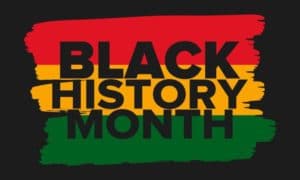
Government data from 2020 shows the percentage of pupils eligible for Free School Meals (the Government’s indicator of disadvantage) by ethnic group. In the table we can see 24% of Black African pupils and 28% of Black Caribbean pupils were eligible for Free School Meals compared to 14% of White British pupils, of those receiving their GCSEs in 2020.
Pupils from disadvantaged backgrounds aren’t less able, but they have less access to the tools that support them to progress in school. This means they are not able to reach their full academic potential, significantly impacting their future prospects.
Disadvantaged pupils are, on average, 18 months behind their non-disadvantaged peers by the end of secondary school (EPI report, 2020). In fact, in the 2019 GCSE exams, only 25% of disadvantaged pupils achieved a grade 5 or above in English and maths, compared to 50% of all other pupils (DfE report).
In the Government’s household income data, published in 2021, Black households were most likely out of all ethnic groups to have a weekly income under £600 and as indicated above, children facing socio-economic disadvantage are less likely to achieve meaningful grades in their exams.
Tragically, the data above indicates that our education system is not able to guarantee all pupils the same outcomes and opportunities, regardless of their background or ethnicity, which is simply not fair.
Action Tutoring focuses on reducing the academic attainment gap at the end of primary and secondary school, so that young people’s circumstances don’t limit how much they can achieve academically.
Why history?
At primary school level, 6 out of 8 history topics in the Key Stage 2 curriculum focus on British history and at GCSE level a minimum of 40% of the course must be British history. These topics, recommended by the Department of Education, predominantly focus on White British history, often neglecting other perspectives and contributions which create so much of the diversity and richness in our country’s history.
The curriculum should put more emphasis on the negative legacy of the British Empire and explore much further how the British Empire created a cycle of exploitation which oppressed the Black, Asian and minority ethnic people under its rule.
Dominant narratives in the curriculum of the Industrial Revolution ignore that England ruled over 25% of the world in mid-late 1800s and early 1900s and exploited the natural resources in these territories to fund economic growth in England, whilst simultaneously taking over developing countries’ systems of governance.
The curriculum also doesn’t critique England’s continuing participation in the slave trade after they officially ruled it illegal in 1807, or how England exploited its empire for soldiers during WWI and WWII without guaranteeing them the same rights as White English soldiers.
The curriculum does makes references to the slave trade and civil rights movements in the USA. This is limited as it does not give an accurate picture of England’s involvement in the slave trade, and does not convey similar Black Power movements taking place in Britain.
“If you’re omitting different histories and narratives, you’re saying that these people aren’t part of this country, this nation, this heritage – or they’re not important enough to be taught as common knowledge,” says Melody Triumph, policy specialist at The Black Curriculum – a social enterprise that seeks to redress this imbalance by delivering programmes, training and campaigns about Black British history.
British children from minority ethnic backgrounds deserve to be taught about their history as much as White pupils. Expanding young people’s awareness of the rich history of our multicultural society will help to foster an accepting and less racialised nation. In our English tutoring resources, we have included Black British authors and have referenced the work of the Black Curriculum when reviewing and improving our workbooks because we believe this is essential to a fair and well-rounded education.
History is an important tool we can all use to make sense of our society today. It can help inform, empower and educate. If you want to find out more about Black British history, from the Black Tudors to Black Power movements in the 1980s, take a look at our resource list here and the Black Curriculum’s resources.)
Seven connections to help us create change
22 July 2021

Learn about Action Tutoring’s conversations with local MPs this summer.
We know that what happens on programmes is important. But in an average session, do the pupils and their tutors feel how significant their actions truly are?
Extra marks are gained, concepts are grasped for the first time, new future chances open up slightly more each time a pupil turns up and tries. But beyond individual growth, what happens matters on a greater scale. Everyone involved in our programmes is part of a nationwide movement, where people show up in the belief that a great education can make a more equal society.
Sometimes an opportunity arrives to show pupils and tutors that their efforts are being noticed. At 12pm on Friday 2nd July our Programme Coordinator, Sam, was about to set up for the usual afternoon session at Heathfield Primary School in Nottingham. Things felt a little different, though; two journalists and a camera person were expected at the school reception. The Member of Parliament for Nottingham North, Alex Norris, and our Interim CEO, Jen, would soon be arriving.
Not long after our first programme launched in Nottingham in 2019, Alex agreed to visit an Action Tutoring partner school to see the work being done. When the pandemic closed school doors, the visit couldn’t go ahead. Alex still helped us to get the word out to others at a crucial time via his newsletter.
It was an exciting moment, then, to finally welcome Alex to a session at Heathfield Primary School in July this year. Sam told us about the atmosphere on the day. “The pupils buzzed with a mixture of excitement and nervousness at the opportunity. Their heads were down and focused despite copious distractions. Some were even more studious than usual in a bid to impress their local representative!”
This was a chance for everyone to celebrate the admirable effort pupils had made since November. Sam could see how motivated they were to show off their work and quiz the MP. “The challenging questions they posed to Alex were certainly testament of this, as well as their working-strewn whiteboards which they returned to me at the end of the session.”
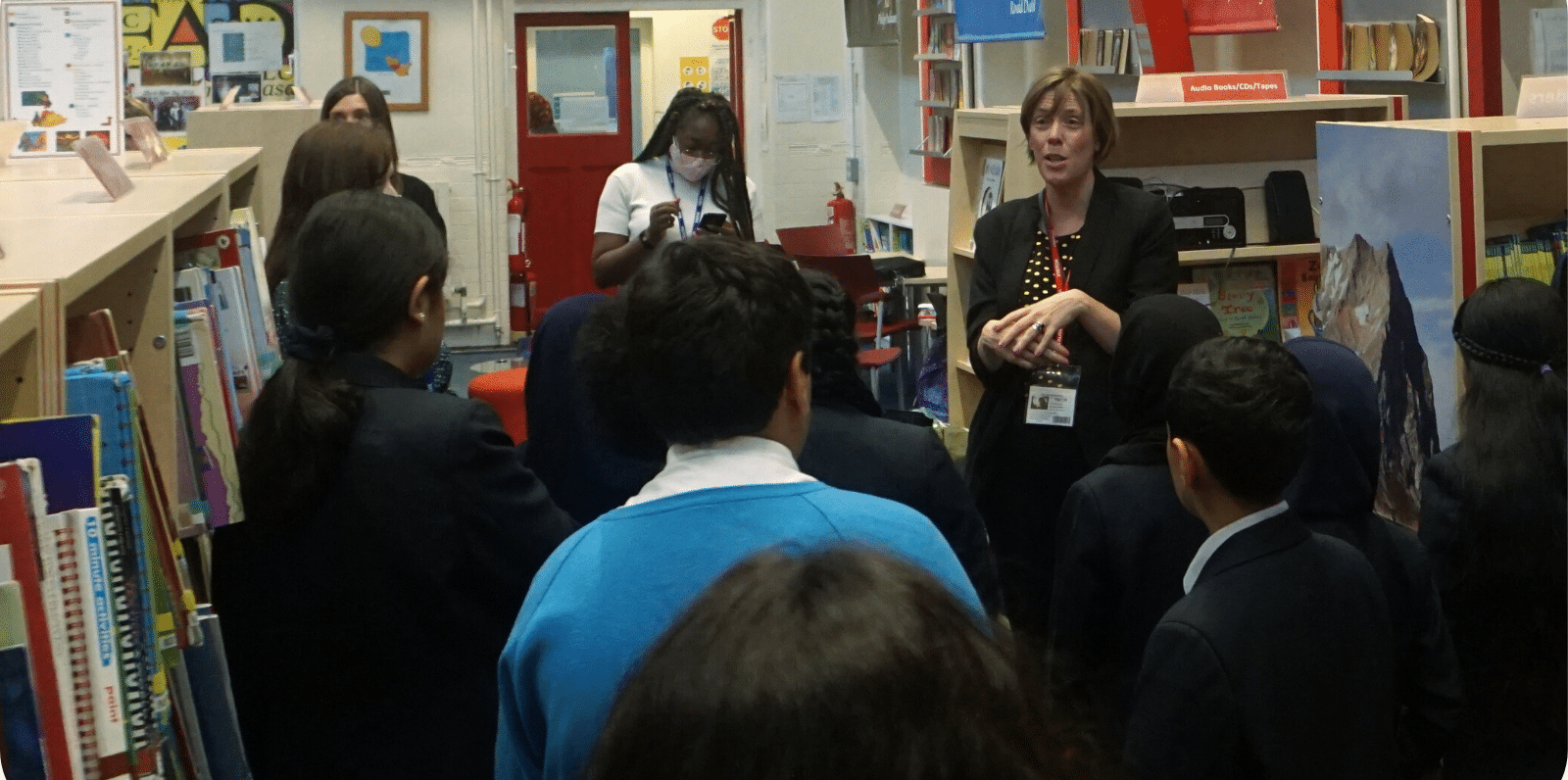
Less than a week later, a similar moment was about to happen at Ark Victoria Primary Academy in Birmingham. The committed MP for Yardley, Jess Phillips, had already witnessed local tutors working with pupils at another partner school back in 2017. But this time, circumstances were quite different. At 8am on Thursday 8th July, just before Jess arrived, tutors were logging in from Birmingham, Cambridgeshire, Exeter and beyond, ready to lead a productive and joyful final session with the Year 6s at Ark Victoria.
Justina has been tutoring at the school since last November and helped her pupils formulate questions to ask Jess Phillips during the visit. “It has been an incredibly rewarding experience to volunteer and support the learning of year six pupils remotely, at a primary school local to me in Birmingham.
“Despite the disruption caused by the pandemic over the last year, my pupils have shown enthusiasm, been willing to learn and have continued to make progress. I’m really looking forward to next year.”
This was the last session for Year 6 at Ark Vitoria after a big year. Another exceptional tutor, Elaine, has been on this journey with the pupils whilst living elsewhere in the country. “As the school year draws to a close, I am really reflecting on how lucky I have been to be able to work with the pupils at Ark Victoria Primary. They have been so cheerful and worked so hard – a great reminder to try our best when sometimes things seem too difficult. I work with Action Tutoring because I want to help young people achieve their best and am always amazed by how receptive the pupils are to the tuition – they always make me want to do more.”
Action Tutoring is hugely grateful to Alex Norris and Jess Phillips for their time and support for these pupils. Their active interest in our work locally has provided a special end to a year of hard work by all involved in our programmes. It has also already helped Action Tutoring forge new connections in the wider community.
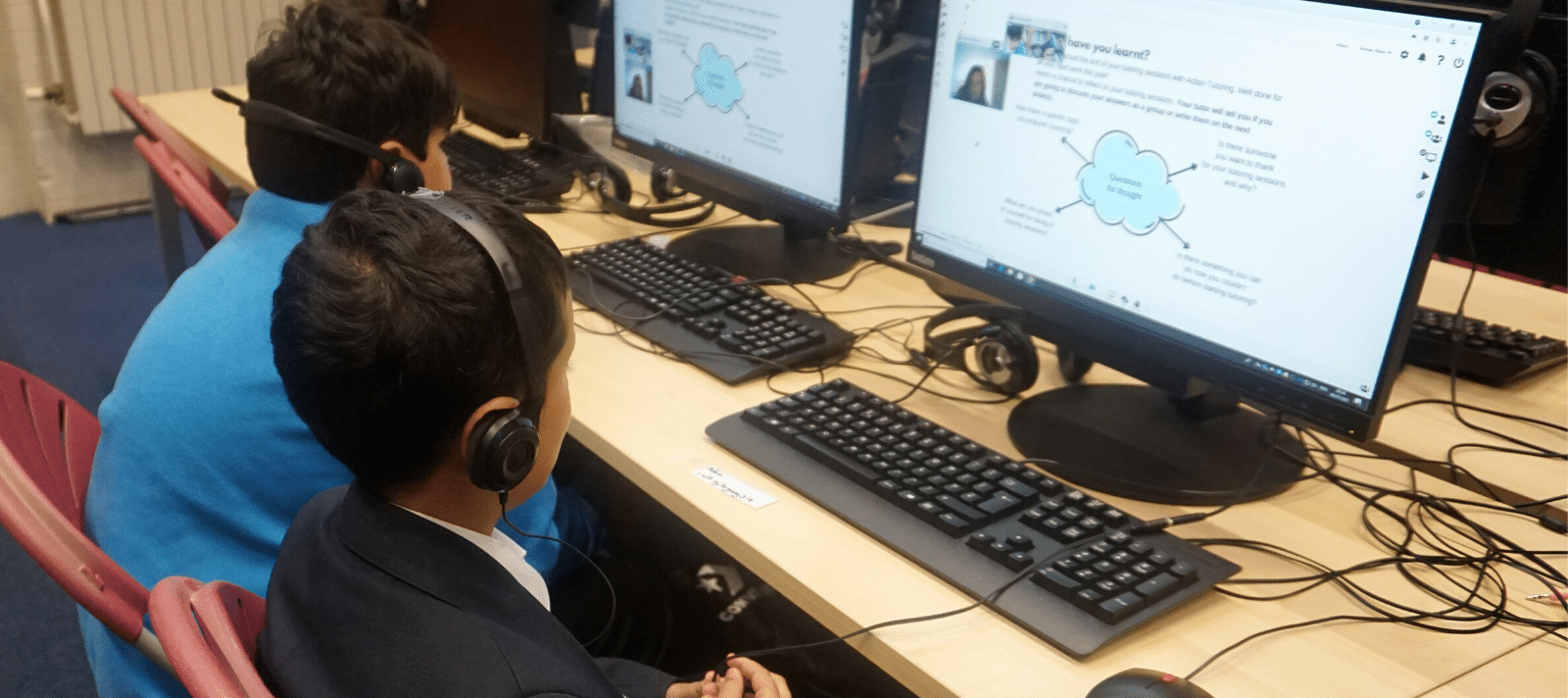
Action Tutoring reaches out to local leaders each year, to highlight the benefits of our work and seek support in raising awareness of what we do. This summer, Action Tutoring has met with seven MPs nation-wide to share the progress its pupils are making in their constituency, despite the additional barriers these pupils face. This seven includes two members of the House of Commons Education Select Committee. Programmes succeed because of the hard work of people in the community – whether that’s the young people themselves, volunteer tutors or the essential school team. These conversations have helped us celebrate and showcase these efforts. Going forward, we hope that deepening these connections will help us to sustain and grow the impact of our work for the unique and vibrant children and young people on our programmes.
A safe place for all: putting an end to discrimination against LGBTQ+ pupils
23 June 2021

Content warning: mentions of homophobia, biphobia, transphobia and mental health issues.
As part of Pride month, Action Tutoring Communications Assistant, Phyllida Jacobs, investigates the extent of homophobia and transphobia in schools and explores what can be done in the classroom to challenge these prejudices.
School should be a welcoming place where everyone feels included and respected. Yet for many LGBTQ+ pupils, this is not the case.
Research by Stonewall found that nearly half of LGBTQ+ pupils are bullied because of their gender identity or sexual orientation, with one in ten trans pupils being subjected to death threats at school. LGBTQ+ young people are more likely to suffer from mental health problems, and more likely to miss school due to bullying. Although this research also shows that the problem has slowly improved over the last ten years, there is clearly much more work to be done.
Schools can play an important role in challenging homophobic and transphobic views that pupils may have picked up elsewhere. Many teachers work hard to challenge these prejudices when they arise. However, too often school can be a breeding ground for intolerance.
The discrimination faced by LGBTQ+ pupils in schools today can be traced back to the controversial Section 28. Between 1988 and 2003 (2000 in Scotland), this law prohibited the “promotion of homosexuality” by local councils. As a result, schools stopped teaching LGBTQ+ issues and often did nothing to prevent homophobic and transphobic bullying. A generation of LGBTQ+ people were raised in a culture of silence, where their very existence was denied. After years of campaigning, Section 28 was repealed, but its effects can still be felt today.
It is now mandatory for schools to teach LGBTQ+ content as part of PSHE, yet two in five pupils report never being taught about these issues. The Department of Education guidance leaves it up to schools to decide how and when the content should be taught, allowing many schools to minimise or ignore LGBTQ+ issues in the classroom.
It’s clear that more needs to be done to prevent homophobic and transphobic bullying in schools, but in March 2020, the Government Equalities Office withdrew funding from LGBTQ+ anti-bullying projects. This must be seen as a worrying step backwards in the fight for LGBTQ+ inclusion in our schools.
The strain of lockdown combined with recent negative media attention on trans issues has only made life harder for LGBTQ+ pupils. If we are to create a culture in which all young people feel safe to be themselves, urgent action is needed. Without proper funding for projects specifically addressing homophobic, biphobic and transphobic bullying, and clear guidance on teaching LGBTQ+ issues, the great progress that has already been made will flounder.
Learn all about Stonewall’s campaign for LGBTQ+ inclusive education and how you can show your support here.
George Floyd’s death, one year on
25 May 2021
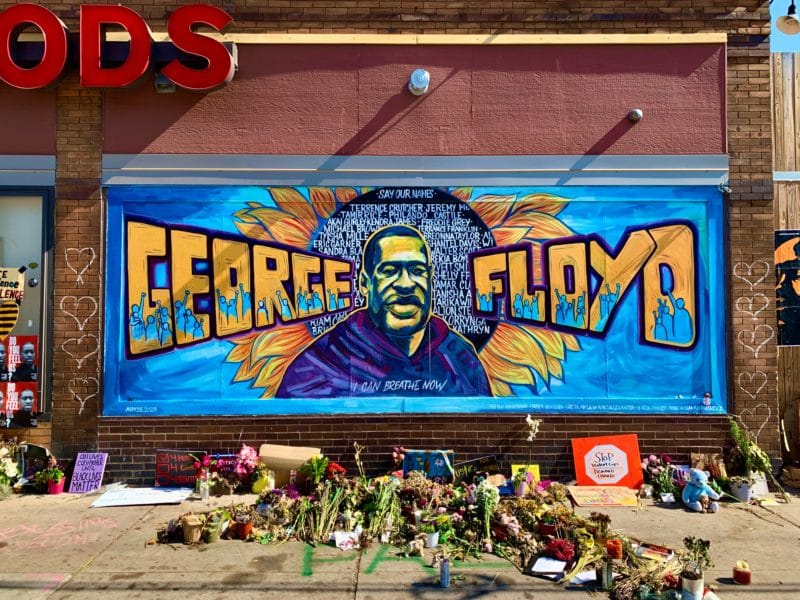
On the first anniversary of the death of George Floyd, Action Tutoring HR and Safeguarding Manager, Jasmin Bemmelen, reflects on the steps the organisation has since taken to improve diversity and inclusion across the charity.

Equality, inclusion, diversity – words that have been buzzing across the world since the death of George Floyd, one year ago. As a result of this event, a problem that has existed for years resurfaced in many people’s minds and the public mood reached a breaking point. His death woke many of us up to the fact that inequality and exclusion are still a reality and that now is time to make the change happen.
These topics are a priority for me as the HR and Safeguarding Manager and the lead for diversity and inclusion at Action Tutoring. Questions such as: ‘How can we change processes and mindsets within a short period of time?’; ‘How can we become a more inclusive employer?’; ‘How can we support our staff on the journey of fixing implicit bias?; ‘How can we break the status quo and dare to have brave conversations about topics that we believe are ‘taboos’ or ‘not appropriate’ to have?, are constantly on my mind.
Working with a wide range of stakeholders (pupils, teachers, tutors, parents and guardians, funders and staff), we knew we had to start the journey of implementing new diversity and inclusion policies, in order to generate the change we want to see across the charity. As part of this, I created a working group that meets monthly, to propose and work on positive actions for the wider team. Every day, we are discovering more elements of our work that we can improve. We are constantly adjusting to become as inclusive and diverse as we possibly can and I believe that this will continue to improve over time.
We need to break down the concepts of inclusion and diversity and convert them into tangible actions, turning them from abstract ideas to concrete steps, so that everyone can get on board.
As a result, we have been implementing ‘everyday actions’ to encourage diversity and inclusion at Action Tutoring, such as:
- ‘Broaden your horizon’ Club – providing a safe space for staff to share their thoughts and ideas, whilst learning more about topics they might not have visited or thought about before.Team members come forward with topics they would like to discuss and resources are shared at the club meetings.
- Adopting the HALO code – we have adopted the very first code that protects Black employees who come to work with natural hair and hairstyles associated with their racial, ethnic, and cultural identities.
- Lunchtime catch-ups and socials to celebrate and create awareness of important dates – (e.g. International Women’s Day; International Day Against Homophobia, Biphobia and Transphobia; Eid and Ramadan).
- Inclusive email signatures – our signatures now have the option to include gender pronouns, recognising the need for pronouns in today’s culture, so that applicants and employees feel comfortable to do the same so that everyone can be addressed correctly.
- Long emails and newsletters now recorded for audio format – for those who prefer to digest information in an auditory way.
Through this process, I soon realised that my own expertise is limited and that if we want to challenge the status quo, external support for our recruitment processes would be needed. Receiving a equality, diversity and inclusion grant and with it the consultancy from the TPP, a recruitment expert consultancy, means we come one step closer to a more diverse team and a more inclusive working environment. We can start becoming the change we want to see in our society, which can ultimately increase our positive impact on the pupils, tutors and schools that we work with.
This anniversary has helped me to reflect on the positive actions we have taken so far, as well as how much more we need to be doing. Going forward, increasing diversity and inclusion across Action Tutoring is a journey that we are committed to continuing on.
To keep updated with the policies we continue to implement at Action Tutoring, please read our blog and subscribe to our newsletter.
Giving Tuesday’s #GiveBack2020 campaign encourages us all to take something positive from this year by making a difference
1 December 2020
As we move towards the final part of 2020, I think it’s fair to say that this year has been an unusual one. Since March, the coronavirus pandemic has dominated global attention, as the virus stretched health systems and threatened the lives of individuals across the UK and the rest of the world.
As a result of the consequent lockdown, pupils’ learning suffered significantly. Disadvantaged pupils were, on average, already 18 months behind their non-disadvantaged peers by the end of secondary school even before the school closures in March, and this is only likely to have worsened as a result of the disruption in school learning.
Partner as a school Become a volunteer
After nearly seven months out of schools, our tutoring recommenced in early October 2020, with the support of the charity’s incredible and inspiring volunteer tutors, partner schools and staff team, all determined to ensure disadvantaged pupils can still succeed. We also launched our online delivery in schools, uniting pupils from across the country with volunteers to tutor them in maths and English.

Photo courtesy of Abbeywood School
#GiveBack2020
The Giving Tuesday campaign is a global day of giving, where everyone, everywhere can do something to support the good causes that mean so much to them. This year, the focus of the campaign is on giving back, encouraging us all to take something positive from 2020 and make a difference at the same time.
In line with this campaign, Action Tutoring would like to thank all its amazing volunteer tutors who are already giving their time to do something positive by helping pupils across the country. The work that they have done this year in offering disadvantaged pupils the support that they need to catch up and achieve their academic potential, helping us bridge the educational attainment gap in the process, has been outstanding.
We would also like to take this opportunity to encourage anyone who may be interested in tutoring pupils in their local area and across the UK to rise to Giving Tuesday’s challenge to give back, and support disadvantaged pupils by becoming a volunteer tutor.
Rosie and Mike, two of our current tutors at Sydenham School, told us about their motivations for volunteering and how their experiences as tutors, in the midst of a pandemic, have been so far.
“For me, what has been rewarding in my tutoring Secondary English at Sydenham is when, after a couple of sessions, it becomes clear, during a recap task, that my pupil has definitely retained some of the key points that we discussed earlier. For example, when they are able to recall a number of language devices, and can give examples of them, which is a very important tool for ‘analysing language and evaluating texts’ questions. It’s great to see that the online method is working, and that the pupils are getting benefit from it.
“I think it’s always worthwhile giving tutoring support, but particularly so in the context of the current pandemic. With schools being closed earlier this year, there has been a higher risk of children falling behind and not reaching their planned grades. It’s therefore very good news that the online tutoring portal is being delivered successfully, and I do get personal satisfaction in believing that in some way I am able to help pupils regain ground.”
– Mike Perrott, Secondary English tutor at Sydenham School
“It makes me so happy when I teach my tutees a trick to do some maths quicker one week and see them replicate the trick the following week, because it lets me know that my teaching is having an impact and is giving the girls more confidence to tackle difficult maths questions quickly and accurately. I have also found it massively rewarding to become a listening ear for the students and feel as though I have been a sounding board for many of their queries, such as GCSEs, mock exams, revision and university choices.
“When I heard about this programme, I immediately thought that it was a great idea and wondered why I had never heard about it before! At school, I was a bit of a nerd and actually really enjoyed maths; hearing about an opportunity to share some of the tips, tricks and skills that I had learnt really incentivised me. As I am currently at uni, my GCSE days were not that long ago, so I felt really encouraged to get involved – I feel I’m someone with a useful perspective on GCSEs and how to work hard for them. Additionally, when I realised that this programme was as much about academic development as it was about boosting the confidence of the pupils and making them believe in themselves, I needed to get involved because I feel this is often a forgotten aspect of education.”
– Rosie Webb-Jenkins, Secondary maths tutor at Sydenham School
If you are unable to commit to becoming a tutor right now, or would prefer supporting our mission financially, we invite you to donate via the link below.










